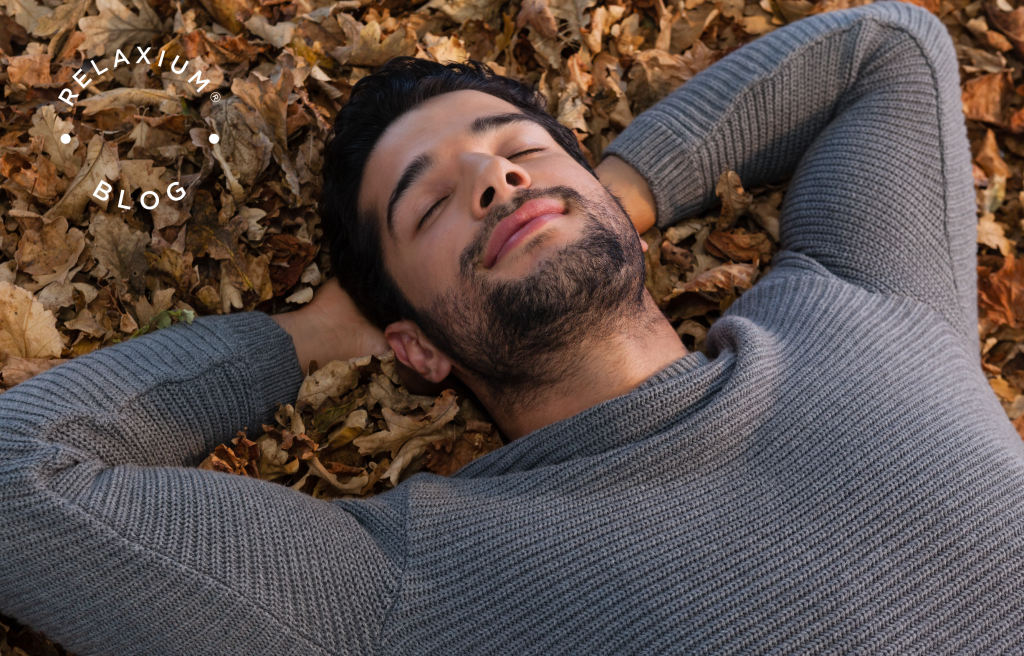As the leaves begin to change the days start to grow shorter, the transition from summer to fall signals a time for reflection, coziness, and embracing the beauty of nature’s transformation. However, with the changing seasons comes a shift in our sleep patterns. The shortened daylight hours can disrupt our circadian rhythms and impact the quality of our sleep. In this blog, we will help you navigate the autumn sleep challenges and create a restful sleep routine that incorporates Relaxium Sleep, our trusted and drug-free sleep supplement.
The Science of Autumn Sleep Disruptions
Before we dive into creating the perfect autumn sleep routines, let’s understand why this season can be particularly challenging for our sleep patterns.
Less Daylight: With the sun setting earlier each day, our bodies receive fewer cues to stay awake during the evening hours. This can lead to earlier feelings of sleepiness and difficulty staying awake in the evening.
Temperature Changes: The drop in temperatures can affect our body’s thermoregulation, making it harder to find a comfortable sleeping temperature. Keeping your bedroom cozy becomes essential.
Seasonal Affective Disorder (SAD): Some people experience seasonal depression known as SAD during autumn and winter. SAD can disrupt sleep patterns and cause symptoms like oversleeping or insomnia.
Dietary Changes: Autumn often brings a shift in our diets towards heartier, comfort foods. While delicious, these changes can affect our digestion and sleep if consumed too close to bedtime.
Now that we understand these challenges, let’s explore a comprehensive autumn sleep routine that incorporates Relaxium Sleep to ensure restful nights throughout the season.
Crafting Your Autumn Sleep Routine
- Prioritize Consistent Bedtime
Maintaining a regular sleep schedule is crucial year-round, but it becomes even more important during autumn when daylight hours vary. Aim to go to bed and wake up at the same time each day, even on weekends. This consistency helps to regulate your body’s internal clock.
- Create a Cozy Sleep Environment
As temperatures drop, ensure your bedroom is a warm and inviting place. Consider investing in soft, warm bedding and cozy sleepwear. Use blackout curtains to block out early morning light, and maintain a comfortable room temperature for quality sleep.
- Light Exposure
With less natural light available, it’s essential to maximize your exposure to natural daylight during the daytime. Spend time outdoors, take a walk during your lunch break, or open your curtains wide in the morning. Exposure to natural light helps regulate your body’s sleep-wake cycle.
- Mindful Eating
Be mindful of your diet, especially in the hours leading up to bedtime. Avoid heavy or spicy meals close to bedtime, as they can disrupt digestion and lead to discomfort. Opt for a light, balanced evening meal.
- Evening Wind-Down
Incorporate relaxing activities into your evening routine to signal to your body that it’s time to wind down. This can include reading a book, taking a warm bath, practicing gentle yoga, or listening to soothing music. Avoid stimulating activities like watching intense TV shows or working out right before bed.
- Try Relaxium Sleep
As part of your autumn sleep routine, consider incorporating Relaxium Sleep. Relaxium Sleep contains a blend of drug-free ingredients, including melatonin, valerian root, and chamomile, which are known for their sleep-promoting properties. Taking Relaxium Sleep about 30 minutes before bedtime can help you fall asleep faster, stay asleep longer, and enjoy a more restful night’s sleep overall.
- Limit Screen Time
The blue light emitted by screens from phones, tablets, and computers can interfere with your body’s production of melatonin, a hormone that regulates sleep. Aim to avoid screens at least an hour before bedtime to allow your body to prepare for sleep naturally.
- Stay Active
Regular exercise can improve sleep quality, so don’t let cooler weather deter you from staying active. Consider indoor activities like yoga, Pilates, or gym workouts. Just be sure to complete your workout at least a few hours before bedtime to allow your body to cool down.
- Manage Stress
Autumn can be a busy time with the start of school, work projects, and holiday planning. Practicing stress management techniques such as mindfulness meditation, deep breathing exercises, or journaling can help you relax and reduce anxiety before bedtime.
- Monitor Your Sleep
Keep a sleep journal to track your sleep patterns and identify any trends or disruptions. Note your bedtime, wake time, and any factors that may have influenced your sleep quality. This information can help you maintain adjustments to your routine as needed.
Embrace Autumn as a Season of Rest
Autumn is a time of change and transition, and by embracing it as a season of rest, you can make the most of its unique beauty and serenity. With a consistent sleep routine, a cozy sleep environment, and the support of Relaxium Sleep, you can ensure that your sleep remains restful and restorative throughout the season.
Remember that quality sleep is essential for overall health and well-being. By prioritizing your sleep and following these autumn sleep routine tips, you can enjoy the wonders of the season while waking up refreshed and ready to embrace each day!
At Relaxium, we have a simple mission in mind – to create affordable, safe, and effective supplements. Through extensive research, we created four life enhancing supplements: Relaxium Sleep, Relaxium Calm, Relaxium Immune Defense, and Relaxium Focus Max. We use a perfect synergistic blend of ingredients in our products to ensure results. If you are interested in trying our Relaxium products, click here for more information!
To restful and healthy days ahead,
The Relaxium Team
*These statements have not been evaluated by the Food & Drug Administration. This product is not intended to diagnose, treat, cure, or prevent any disease.

